How The Last of Us gave Bill and Frank the 'beautiful, completely surprising love story' they deserve
Warning: This article contains spoilers from The Last of Us episode 3.
The third episode of HBO's The Last of Us is a declaration. Those keeping track of all the strict one-to-one adaptations from the original video game were informed in a direct way that the show was going to swerve off the main plot path in unexpected ways. Even Murray Bartlett, a gaming novice, says he was "flabbergasted by the entire production."
"It's a weird anomaly," the White Lotus actor, who plays survivor Frank, tells EW while sitting next to his costar Nick Offerman. "It's an incredible series of which we were cast in a Sundance movie that was dropped in. We're completely in our own world."
"It's a beautiful, completely surprising love story in the middle of Cormack McCarthy's The Road," agrees Offerman, who plays Bill, a prepper that reconstructs his small town into a private, self-sustaining man cave as soon as the fungi apocalypse hits.
Joel (Pedro Pascal) and Ellie's (Bella Ramsey) plague odyssey brings the reluctant pair to Bill's doorstep, which series creators Craig Mazin and Neil Druckmann used as an opportunity to flesh out the character's backstory with Frank.
"I had an instinct that we would probably need to take a breath as an audience after the first two episodes," says Mazin, who executive produces and writes The Last of Us with Druckmann, referring to the deaths of Joel's daughter Sarah (Nico Parker) in the premiere and his lover Tess (Anna Torv) a chapter later. "I wanted a way to show some of the passage of time between Outbreak Day and the current day of the show without doing more of the same, of the world falling apart."
Bill of goods
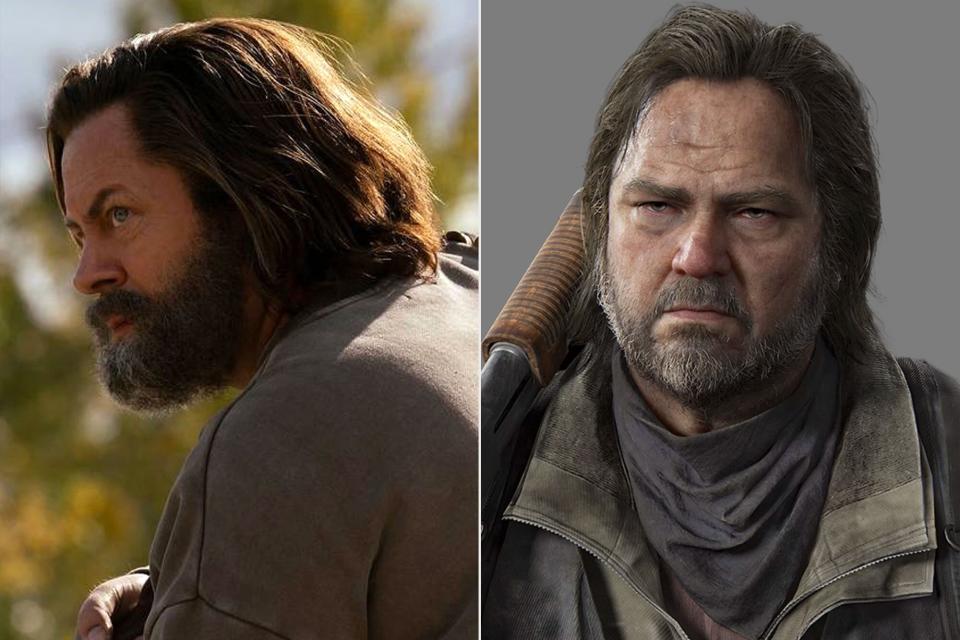
Liane Hentscher/HBO; Naughty Dog Nick Offerman's Bill compared to the character in 'The Last of Us' video game
As succession of events goes in 2013's The Last of Us, the game that started it all, Bill enters the picture after Tess' last stand. He resides in the town of Lincoln, where he booby-trapped the entire deserted community against the ravenous Infected. Joel warns Ellie that he doesn't quite mesh well with other people and warns her to not speak out of turn. Still, they have history and for one reason or another, Bill owes Joel a favor or two.
The first time Bill shows up in the game is when the player, as Joel, is in a dire situation: Joel is shooting at oncoming Runners (a nickname for the type of fast-moving Infected) while dangling upside down from tripping one such defense.
Peter Hoar, who directed episode 3 of the series adaptation, associates this moment with gamer rage. "I was playing that section forever," he says, laughing. "I think I'd clouded my memories of [Bill's] story with all of that [reaction], like, 'God!' and throwing the controller around."
Frank, however, never fully shows up. He's another survivor who's been living in Lincoln with Bill for a time, but the game finds that he eventually killed himself. A single shot sees Frank's legs dangling from the ceiling and nothing more.
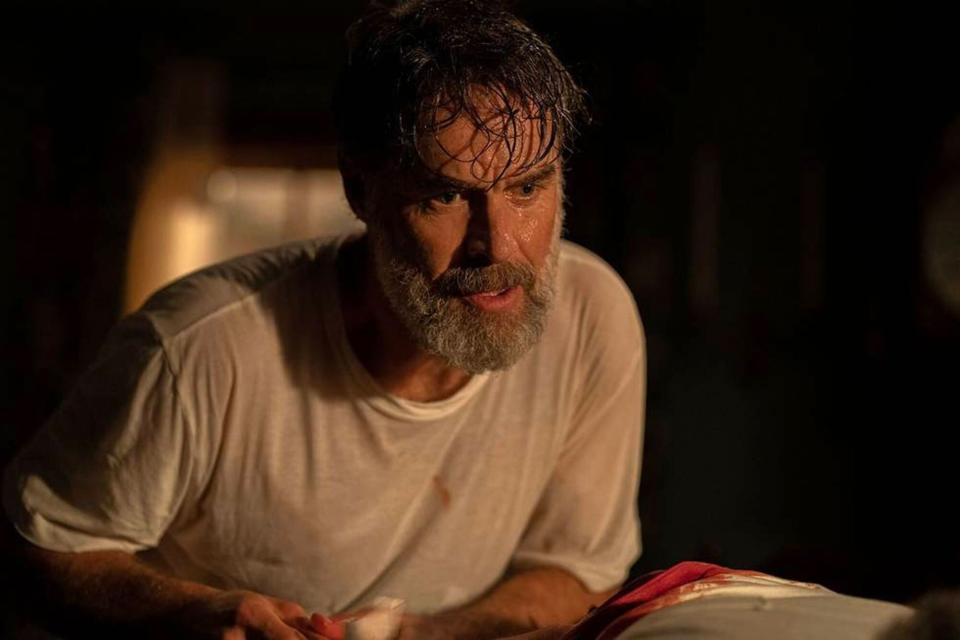
Liane Hentscher/HBO Murray Bartlett's Frank in 'The Last of Us'
"The word 'partner' is used and it's in a limited emotional sense," Hoar recollects. "You're like, 'Business partner maybe?' And this is why I love the way they told that story [in the game] because it feels like it happens just off camera and then you have to run away again, 'cause games can't stop." It's only later, once Joel is driving away from Lincoln, that Ellie finds gay porn magazines in the backseat and the full picture comes together.
"The character Bill is fascinating," Mazin says. "I love the idea of a guy who was actively preparing for the world to end, and when it did he was like, 'Good!' Bill in the game is a dark prediction of where Joel could end up if he doesn't open his heart back up again: alone in a fortress of his own making, paranoid and grouchy. I felt like, we can go and actually do a different thing, which is to say there's an omen of hope. You can actually, in this world, still find somebody that you can share your life with. Nobody lives forever, but the goal that we should all have is to have a good life. And when the end comes, we are satisfied."
Inquisitive players can discover a note in the game that Frank leaves behind for Bill before his hanging. He explains that he couldn't stand living with Bill any longer. Druckmann, who developed the original games, says there was no reality in which they would've adapted that Bill-and-Frank outcome for the HBO drama.
"I think Craig from the get-go had the right instinct," he explains. "We have a lot of examples of dark outcomes of these loving relationships, and it was really smart to have a positive outcome just as a counterpoint. There was stuff to draw from that note. They have different life philosophies, and for Frank it wasn't just about survival, it was about something else."
"If we're watching a show and nobody ever has a happy ending, what are the odds that the people we care about are gonna have a happy ending?" Mazin adds. "We need to know that there's a chance that things can go right."
An enduring love
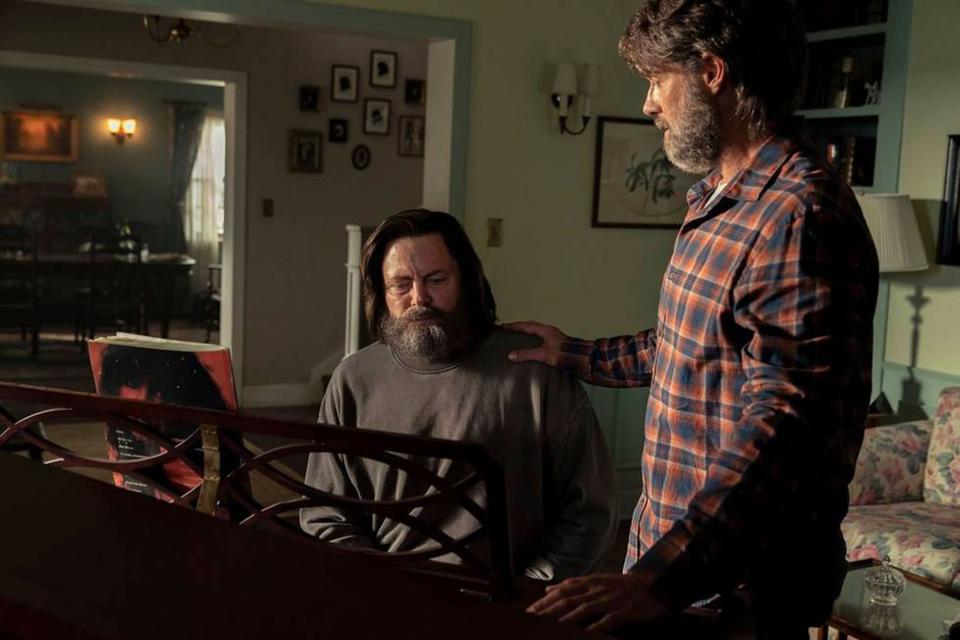
Liane Hentscher/HBO Nick Offerman's Bill and Murray Bartlett's Frank fall in love in HBO's 'The Last of Us.'
Mazin was anxious to send a draft of the Bill and Frank episode for The Last of Us to Druckmann. It was quite the departure from the source material. Druckmann, however, says the changes were warranted "because what we're getting in return is so worth it."
To pull this off, Mazin and Druckmann turned to Hoar. Yes, he's had experience telling poignant and heart-wrenching gay stories through HBO Max miniseries It's a Sin, but his work on shows like Daredevil, The Umbrella Academy, Doctor Who, and Altered Carbon are a reflection of his inner geek-hood.
Hoar jokes, "They were like, 'OK, we know he's a gay man and he loves telling stories about gay men, and he loves science-fiction. Great. When can you start?'"
It took 20 days of prep and 20 days of filming in Calgary, Canada, to make the episode. The art department built the entire village for the set, though some elements, such as roofs and spires, were inserted in later with visual effects. Hoar was given the same runtime as all the other episodes, but the length kept expanding in the editing phase.
"I think my first cut was 77 minutes and I think at the moment it's 75," he says. "Seventy-two was what I handed in 'cause I felt guilty, and then Craig was like, 'No, let's put all that stuff back. It's so good.' Kudos to HBO because a lot of networks wouldn't have done that. I really don't think we would be here having this conversation if that had happened. If it had to be a 59-minute episode, I think everyone would've gone, 'That didn't quite work.'"
The story takes place in flashbacks. Bill watches through his surveillance cameras in a secret bunker beneath his house as the military rounds up everyone in town. Soldiers ferry civilians to a designated quarantine zone, but what the townsfolk don't know is they'll be executed if there isn't any room for them. As Joel says in the present day, "Dead people can't be infected."
With everyone gone, Bill goes to work. He gathers supplies from an abandoned Home Depot, builds a protective fence around the community, sets mechanical defenses to ward off any unwanted visitors, launches his own personal farming and agriculture industry, and (most importantly) raids the nearby liquor store.
"If anyone was gonna survive, it would be Bill," Hoar says. "He starts off as a completely distrusting prepper, survivalist, probably Trump voter, and then goes and does the thing he knows he was born to do, which is survive and keep people away."
Offerman was eyed for the role of Bill, but he initially couldn't make it work. "I'm a huge fan of Craig, and so I knew, 'Here's a script from Craig and it's for his new show and it's gonna be something very special,'" he recalls. "It was in a time when I didn't have time to go do it, so it was this immediate dilemma. I didn't even wanna read it."
Once he did read it, he felt a kinship to Bill. "He can weld and build and fabricate anything. I'm like that to a much lesser degree. I love to make things," Offerman says. "Part of that competence, that sensibility, I think, is fear-based. It allows me to feel like I'm in control of my immediate surroundings, so nothing bad's going to happen to me. I can never die because I can build a roof. I think for maybe both Bill and I that's a way that we protect ourselves from having to feel things."
Still recognized for his mustachioed role of no-nonsense Ron Swanson on Parks and Recreation, Offerman adds, "As someone who's often accused of being crusty or masculine or taciturn, I loved the challenge of playing this character outwardly tough who ends up being vulnerable and having a rich emotional life. It was very gratifying."
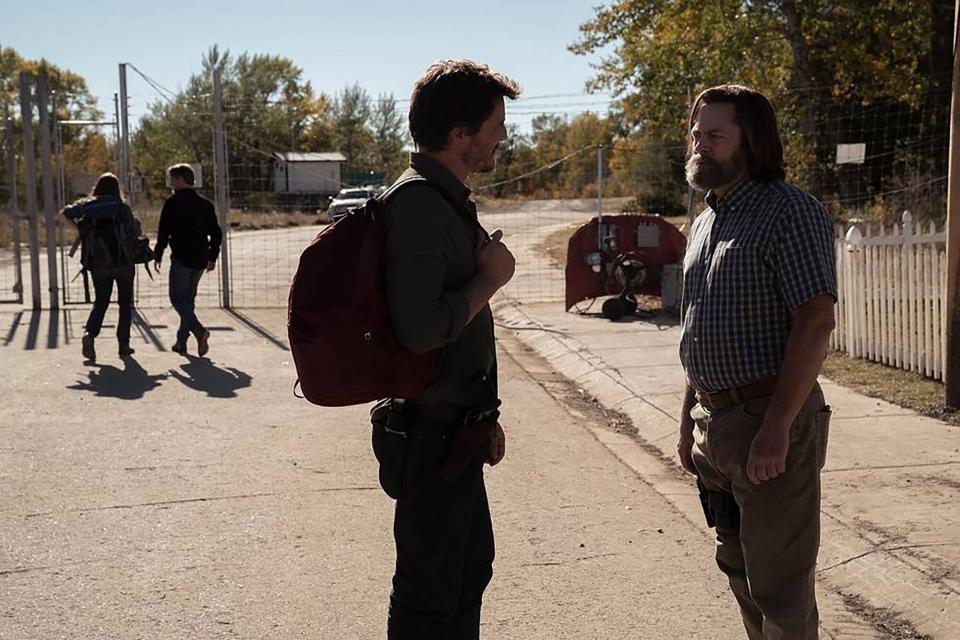
Liane Hentscher/HBO Joel (Pedro Pascal) and Tess (Anna Torv) meet Bill (Nick Offerman) and Frank (Murray Bartlett).
It's not until years later, when Bill is in his routine of making exquisite rabbit dinners with the perfect wine pairing, that Frank comes into his orbit. Fleeing from the fallen Baltimore quarantine zone, the bearded stranger falls through a hole in the ground — one of Bill's traps — on his way to the Boston QZ. A wary Bill acquiesces to Frank's request for a hot meal, and soon his first visitor since the outbreak is wooed by a hot shower and fine dining.
That was Bartlett's starting point for building the character. "I was struck by the eagerness of Frank to muscle his way into this compound in a very Frank way of being charming and sort of manipulative in a charming way," he says. "I guess that comes from a survival instinct, but I think it's also very Frank to do that."
The two seem like stark opposites. Frank's a chatterbox. Bill's quiet, reserved. Yet both men feel a connection to each other. It's not until they are sitting at a piano, playing Linda Ronstadt's "Long Long Time," that they first come together. Frank playfully remarks as the two lie naked in bed later on that he doesn't sleep with just anyone, so if they do this, he'll be staying for a few more days.
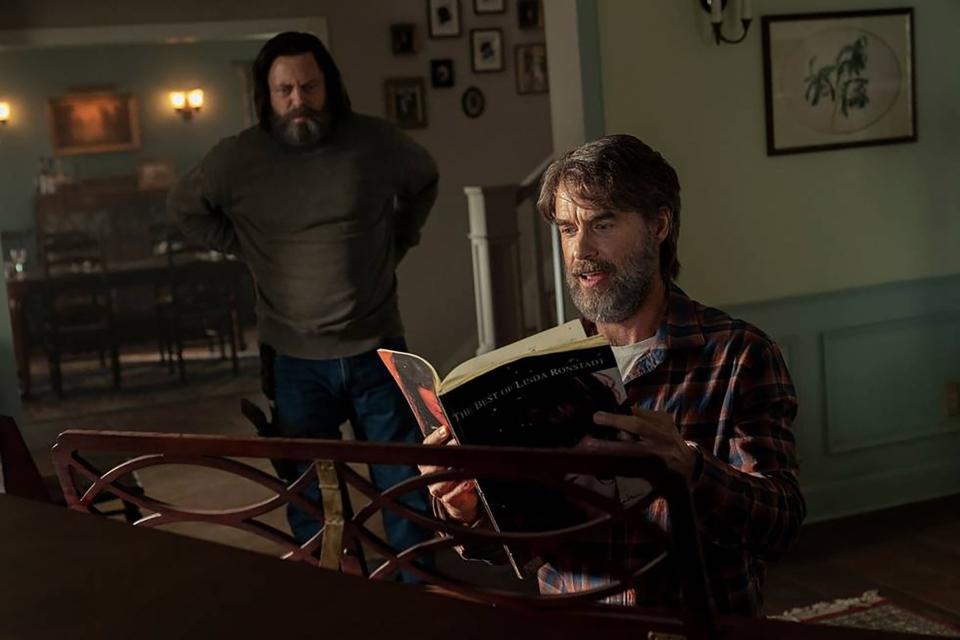
Liane Hentscher/HBO Murray Bartlett says he had to learn how to play piano badly for 'The Last of Us' Linda Ronstadt moment.
The episode unfolds to show the life the couple build across the years, from the highs and lows that shape their relationship.
They squabble about how "the government are all Nazis." They argue when Frank wants to zhuzh up the town because "paying attention to things, it's how we show love." Bill freaks even more when he learns that Frank has been speaking with a woman, Tess, over the radio, eventually leading to a trade alliance with her and Joel. Another moment from another year shows Frank surprise Bill with the strawberries he grew in secret as a surprise. (That Bill giggle is the same laugh Offerman gives in our interview.) "I was never afraid before you showed up," Bill coos as he tastes the fruit of Frank's labor.
"Frank's backstory is slight in the sense that we don't know anything about Frank, really," Hoar points out. "He appears, he reacts to his situation, he's led into the world of Bill. It's only really when he comes bursting out and goes, 'Oh my God, I can't stand you!' when you think Frank's a bit fiery. That's a good thing. You can see his influence on Bill. He starts trimming his beard and wearing nicer stuff and all that sort of thing. All of those little details I loved."
Bartlett also praises the details in Mazin's writing. "The script was so beautifully drawn in terms of these characters. There weren't a lot of spaces to fill in," he says. "What was beautiful is the relationship happens when the two characters come together, and when the two actors playing those characters come together. I was blessed to have an amazing actor to work with. I had some ideas about Frank and some clearly-drawn things in the script that make you feel very supported. And then I felt like the character was revealed to me in the interactions with Nick as Bill."
One scene from the episode became a flashy reminder of the kind of show the crew were making, despite their more intimate storyline. A time jump sees one of Joel's warnings come to pass: Frank races to patch up Bill's bullet wound as they are set upon by raiders. He helps his injured love hobble into the house as fire from the traps illuminate a rain-drenched night. Hoar calls that scene a "gear shift."
"Oh wait a minute, this isn't an indie film anymore. This is something crazy," the director remarks. "I had a little help from Craig, who had to go out and get some extra closeups and stuff to make the whole thing feel really, really good. It was a bit like panic for one long night, but I don't see any of this as too challenging. I think I'd go and get another job if felt it was too much of a challenge."
Love will abide
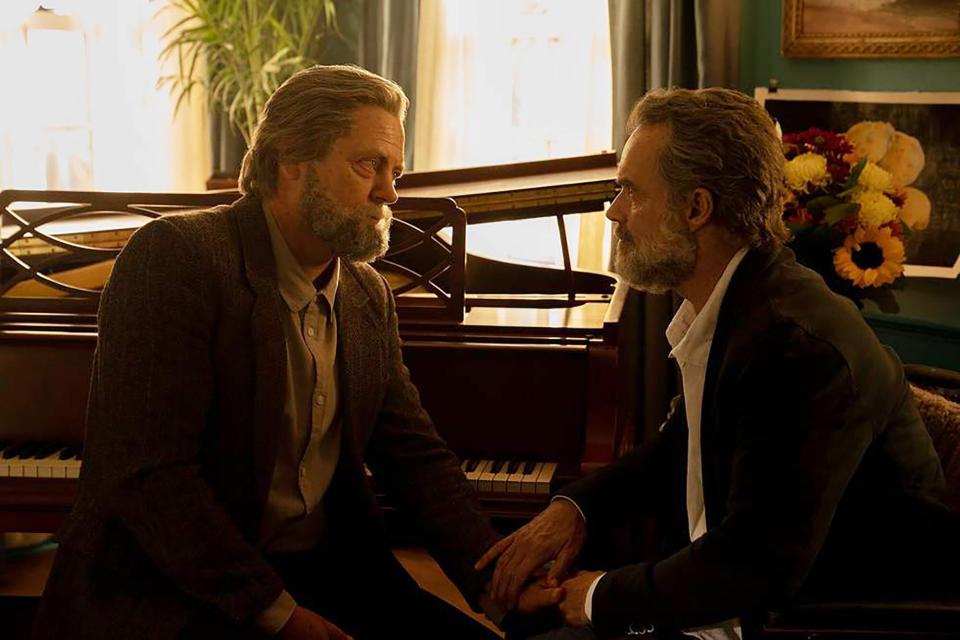
HBO An older Bill and Frank celebrate their last day together in 'The Last of Us.'
In the end, the raiders fail to overtake the compound, and Bill and Frank are allowed to live out their lives in peace (by apocalypse standards). The final cut takes us to the present year, Offerman and Bartlett decked out in full elderly prosthetics.
A wheelchair-bound Frank is dying of cancer. He numbs the pain with drugs, presumably ones they got from Joel and Tess. To spare himself the suffering, Frank tells Bill he wants to end his life by crushing up the remaining meds into his wine. But first, he plans one last happy day with Bill. He wants to finally marry the love of his life, the man who saved him years earlier. What he doesn't plan for is Bill's decision to die with him.
Offerman doesn't believe Bill takes much for granted or leaves most things to chance. "He generally is a planner and an organizer," he says. "I think when Frank makes the decision, Bill has to take a deep breath. He knows that he's not gonna win this argument if he fights. I think in doing so, he's making a grocery list in his head. Somewhere making that checklist, he's like, 'I'll do the drink too. I think he's a pragmatist, so it's perfectly prudent."
The song "Long Long Time" bookends the couple's entire saga. Offerman and Bartlett play the Ronstadt tune on the piano at Bill and Frank's meeting and the recorded version resounds at their death.
The actors remember learning to play the song for that earlier scene. "In the script it says I play it badly, and I think I nailed that," Bartlett says with a laugh.
Offerman also chuckles when he thinks of those rehearsals. "When I first began performing the song, they did have to ask me to clumsy it up a little bit because some of the crew kept thinking it was actually Linda Ronstadt," he jokes. "These things, there are a lot of smoke and mirrors going on that the audience will never know about."
"I remember Craig saying, 'No, you have to get this bit here and this bit here,'" adds Hoar. "Craig's got a lovely voice actually. He was being, in a way, quite prescriptive, which I have no problem with, but what I wanted Nick to know was, if you don't get any of those things, it's fine with me because I just want it to be beautiful in your way. I want Nick Offerman as Bill to just be singing his heart out. That's what will really matter at the end of the day. Just be gentle with it and love it for what it is."
Viewers are left with this needle drop as a final offering as the credits roll. In a similar way, Mazin hopes Bill and Frank resonate throughout the whole season.
"The idea was to show these two people functioning in a relationship, two very different people who have different concepts of how to love," he says, "and in their relationship and their two different ways of loving, both outward and inward, we create a kind of thematic codex for the whole show. Every relationship we see from that point forward, you can feel like a Bill and Frank kind of lurking inside everybody."
Sign up for Entertainment Weekly's free daily newsletter to get breaking TV news, exclusive first looks, recaps, reviews, interviews with your favorite stars, and more.
Related content:


